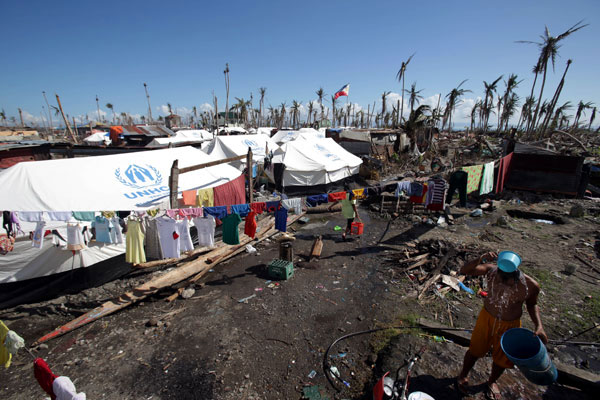
A typhoon survivor takes a bath beside donated tents at typhoon-ravaged Tolosa town, Leyte province, on Dec. 9, 2013. The International Federation of the Red Cross and Red Crescent Societies, assisted by the Philippine Red Cross, handed over an initial donation of 500 shelter kits to Supertyphoon “Yolanda” survivors of Barangay Maya, DaanBantayan, Northern Cebu, to help families rebuild their homes. AP FILE PHOTO
MANILA, Philippines—The government has set up a P2-billon fund that aims to help small businesses get cheap financing to bring their lives back in order, create new jobs and revive the economies of areas still recovering from typhoon “Yolanda” (Haiyan).
In a statement, the Department of Budget and Management (DBM) said it had given the green light for the release of P2 billion to establish a new credit support fund (CSF), which could benefit about 416,000 entrepreneurs.
“Affected micro-entrepreneurs will be provided loans at extremely low interest rates for various livelihood activities, such as sari-sari stores, livestock, hog, cattle and goat raising, piggery, fisheries, poultry, and farming, among others,” DBM Secretary Florencio Abad said.
The P2 billion financial aid complements ongoing reconstruction and rehabilitation activities in areas ravaged by the super typhoon.
“The Credit Support Fund is designed to help communities not only to get back on their feet but also to make their lives even better than before the calamity struck,” Abad said.
The P2-billion Credit Support Fund—released to and charged against the Bureau of Treasury’s (BTr) Special Account in the General Fund—will be transferred to the Land Bank of the Philippines (LBP) under its Calamity Rehabilitation Support (CARES) Program.
The funds will then be lent to microfinance institutions (MFI), which specialize in financing livelihood programs with only a 4.5-percent interest rate.
Of the total P2 billion release, 50 percent or P1 billion will be loaned to MFIs, which will re-lend to micro-enterprises. The other 30 percent or P600 million will serve as a credit guarantee to the end-borrower or the micro-entrepreneur, while the remaining 20 percent or P400 million will be provided to micro-finance conduits as operational support.
Among the eligible MFIs to carry-out the program include rural, cooperative, and thrift banks, cooperatives, and non-government organizations.
“By tapping MFIs, we are not only speeding up the delivery of much-needed livelihood assistance to our affected communities. We are also strategically investing in inclusive social structures that empower our poor countrymen through direct, immediate and substantial access to capital,” Abad said.
RELATED STORIES
P17.7B released for ‘Yolanda’-hit areas, says DBM
Infra spending jumped 45% in January

